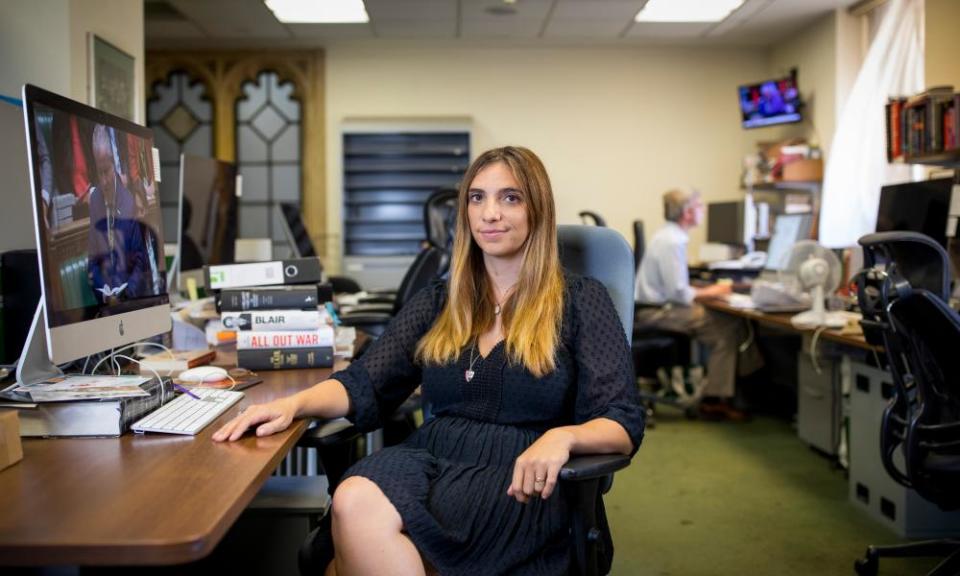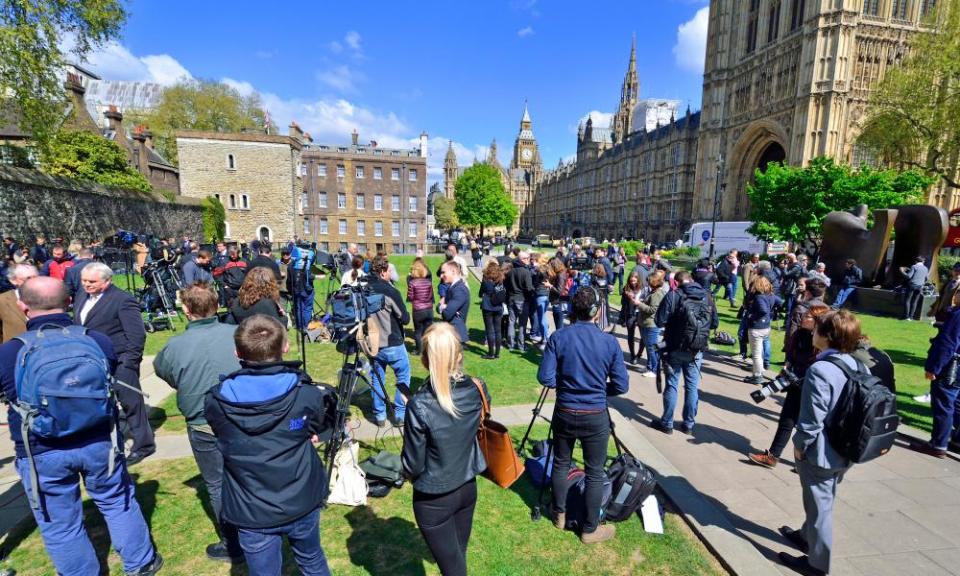‘We never went home before 10pm’: 50 years of reporting on politics and power

Lobby journalism is a constant battle of contradictions – and that’s before you get to Boris Johnson.
On the one hand, it’s a glamorous mix of receptions in Downing Street or the House of Commons terrace and flying on the prime minister’s jet to Washington or Beijing.
It also means working in a cramped and often freezing office on the decrepit parliamentary estate – where old telephone booths are stacked with mouldy press releases, carpets have three-decade-old stains and reporters have rubbish bins on their desks to catch the leaks from the ceilings.
Working shoulder-to-shoulder with ministers, MPs and civil servants means chats in the coffee queue can become front-page scoops. In that sense, little has changed here since Julia Langdon joined the Guardian in 1977. She was one of the few female reporters at that time; female representation is improving 40 years later, but the lobby is still overwhelmingly white and male.
Serendipity is everything. For Langdon, that was how she got one of her first big scoops at the Guardian, at a drink in the Red Lion pub on Whitehall – which is still today the afterwork pint of choice for many hacks and staffers.
“I knew someone in the Treasury who said the government was muttering about vehicle excise duty. But he didn’t say any more than that,” Langdon recalled.

Photograph: PjrNews/Alamy
“Then I popped into the Red Lion and bumped into Denzil Davies – he was minister of state at the Treasury and he was having a solitary beer. And I said, ‘Oh hi, Denzil, what’s all this about vehicle excise duty?’ And he gasps and says, ‘Oh, how do you know about that?’ And he tells me the whole story [about the plan to abolish it], because he’s had a drink or two and because he thinks I knew about it, which I didn’t. And I had tomorrow’s splash.”
Now of course, MPs and ministers can often prefer to brief journalists by WhatsApp, as well as coordinating reshuffles and rebellions by social media. But the personal connections remain crucial.
“I think the thing that I really like about political journalism is fitting pieces into the jigsaw – making sense of what people say,” Langdon says. “You have to put yourself about a lot, the more you do, the more people tell you the odd thing here and there. And then you run into somebody and ask the right question, if you’re lucky, and it all falls into place and you get a really good story.”
Langdon first joined the lobby for the Labour Weekly newspaper in 1971 and the Guardian in 1977, as No 2 to the paper’s formidable political editor Ian Aitken. Being a member of the lobby means getting a coveted parliamentary pass that can give you access to almost the entire Palace of Westminster and invitations to press briefings.
Those are now held on the record, twice daily, in the infamous new £2m No 9 Downing Street media room built for planned White House-style TV briefings. After a number of embarrassing Covid U-turns, the idea suddenly seemed less appealing to Johnson and they were cancelled.
Langdon entered political journalism at a time of “generational change”, which she said helped her build contacts among the rising stars of the future. “At the 1970 election, there was a clearout of the 1945 generation and there was a thrusting new generation – personified best by [Neil] Kinnock. [By being on Labour Weekly] I was well connected. And I got to know the Tory party, because there was also a new Tory generation.”
Chaos can be good for contacts. My own first week in the lobby coincided with the result of the EU referendum, the resignation of David Cameron and the attempted coup against Jeremy Corbyn.
Watching MPs in tears and squaring up to each other outside backbench meetings in the grand carpeted corridor, I turned to my then-editor Anushka Asthana and asked, nervously, “Is it always like this?” But, fortuitously for me, all my more experienced colleagues on rival papers had seen their contacts burn to the ground and it was a good time to make them afresh, courting both the Corbynites and the European Research Group.

Langdon witnessed extraordinary moments in history too – the dramatic instability of the Callaghan government, the winter of discontent, the rise of Margaret Thatcher and the Brighton bombing.
“All through my life I’ve thought, it’s not going to get more dramatic than this. I can remember, time after time, edging myself into my seat in the press gallery and feeling like I was seated at the turning of the page of history,” she said. “But Brexit – I have to say there has been nothing like that.”
Lobby hours can be long, especially with 10pm votes and hung parliaments, which can make family life difficult – as I found out while nine months pregnant as Johnson’s majority collapsed in 2019. Social life is often blurred with work – Langdon said she was fortunate enough to be newly single during her most frantic work phase.
“We never went home before 10pm, ever. Quite often it would be 1am. In the 1970s and 80s the debates and votes were very lively so I was there all night,” she said. “I used to do the dictation straight off the top of my head into the phone. You started writing about 7pm, then it was last orders for dinner in the press gallery dining room at 9pm.”
Langdon went on to break the lobby’s glass ceiling – the first female political editor of a national paper. She was offered the job at the Mirror in 1984, but there was a significant distraction that evening.
“That was the night of Brighton bomb. And, as it happened, I got food poisoning as well. I was incredibly ill, I had to go to bed. I didn’t really have time to think much about the Mirror,” she said.
She had married her second husband, Geoffrey Parkhouse, who was political editor of the Herald, during her time at the Guardian and the couple had two children.
“It was not easy for people to have children, and I think that needs a lot of attention. I think it’s fabulous that there are so many women working there now, and what a difference it makes and it’s wonderful,” Langdon said.
She was fired as political editor of the Sunday Telegraph over a clash of politics and personality. Since then, she has been a successful freelancer and author, and is still a member of the lobby.
Barriers have been broken during my own time too. My first bosses, Heather Stewart and Anushka Asthana, took on the job of political editor as a jobshare in order to manage childcare.
Even in 2015, some veteran members of the lobby were astounded, unable to believe that two colleagues could work in collaboration rather than try to elbow each other. “Who is really in charge?” one MP once asked me, conspiratorially. I answered truthfully that it really was a team effort.
Slowly, the 19th-century building is catching up with 21st-century norms, even if all its inhabitants aren’t quite there yet.

 Yahoo Finance
Yahoo Finance 